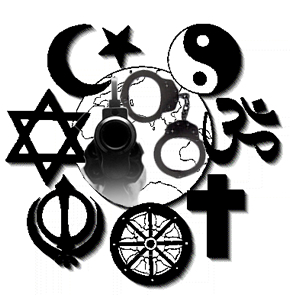Wilful Blindness, Religion and Politics
August 7, 2012 by Paul McKeever
 On his blog, Sunmedia writer Warren Kinsella expresses some puzzlement about why his submitted column on politics and religion didn’t appear in today’s issue of the Sun. Given that a left-wing writer was actually coming to the defence of a Conservative Prime Minister’s privacy, it is a bit puzzling (perhaps a Conservative writer with more pull wanted to be the one to please the PM?). However, in my view, it’s just as well. Kinsella’s defence of the PM was not warranted.
On his blog, Sunmedia writer Warren Kinsella expresses some puzzlement about why his submitted column on politics and religion didn’t appear in today’s issue of the Sun. Given that a left-wing writer was actually coming to the defence of a Conservative Prime Minister’s privacy, it is a bit puzzling (perhaps a Conservative writer with more pull wanted to be the one to please the PM?). However, in my view, it’s just as well. Kinsella’s defence of the PM was not warranted.
Kinsella’s take-home message is this: “If Stephen Harper regards his religion as his own business, the rest of us should mind our own.” He is wrong.
A person’s religion is not some insignificant little jot in a notebook he keeps in the attic. It is his method of deciding what he should and should not do in any given situation; it is his code of good and evil. Were someone to say that he would be willing to make decisions contrary to his religious (or otherwise ethical) beliefs, all he really would be doing is admitting either (a) that he is committed to a code of ethics that he believes is wrong (which would call his judgment and integrity into question), or (b) that he is willing to do what he believes to be wrong/evil.
Those are the choices:
1. A person follows his code of ethics;
2. A person lacks judgment and integrity; or
3. A person is prepared to do evil things.
To say: “If Stephen Harper regards his religion as his own business, the rest of us should mind our own” is just to say “The governed should have no knowledge of the Prime Minister’s ideas about what he ought and ought not to do with the power with which he has been entrusted; no knowledge of any lack of judgment or integrity; and no knowledge of any willingness to do evil.”
There are some pretty bizarre religious beliefs out there. In point of fact, there are billions of human beings who believe that the power executed by the government has its source in a supernatural, omniscient, omnipresent and – worst of all – omnipotent being. Such a belief tends to imply that the government – being the hand of such a god – has whatever power he gives it…which, in the case of omnipotence, is limitless.
Indeed, if we take seriously the story that we sent soldiers to Afghanistan to somehow “free” the people there, or to make them “democratic”, we must conclude that we have been killing people in Afghanistan because their religious beliefs, by our standards, are evil. For the same reason, before I give a person’s religion the role of setting the direction of the government’s guns, the role of deciding whether or not to put me in a prison, and the role of deciding whether or not to expropriate me, I want to know what that religion says about “should” and “should not”; about good and evil.
Were the law-making, law enforcement, and judicial appointment process left to a computer, I’d want to know how it was programmed. The robot currently in charge deserves no less scrutiny. The same goes for anyone else seeking the post. There is no good reason to advocate wilful blindness, especially for a leftie in a Conservative newspaper.





In an ideal society, politics would be defined consistently. This would mean that ethical systems, including ‘religions’, would not be violated by political practice, nor would they impinge on political practice in such a way as to violate the generality of ethics.
Obviously we are not even close to this today. If we were, religious beliefs that found a political practice constraining due to its need to protect all other non-violating beliefs, would therefore be inconsistent with activity in politics.
Thus, the preaching of supremacy of a belief system through force, ie law, is a just concern of the citizen, and is most properly regarded as sedition.